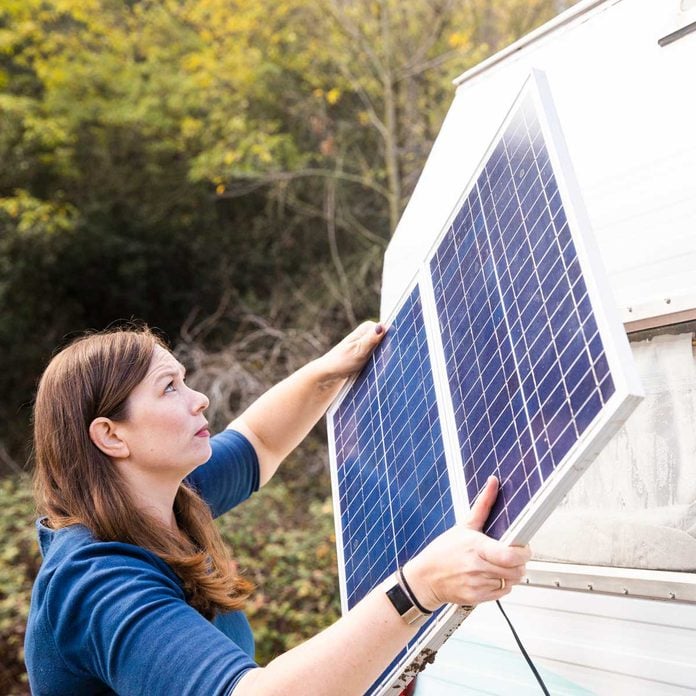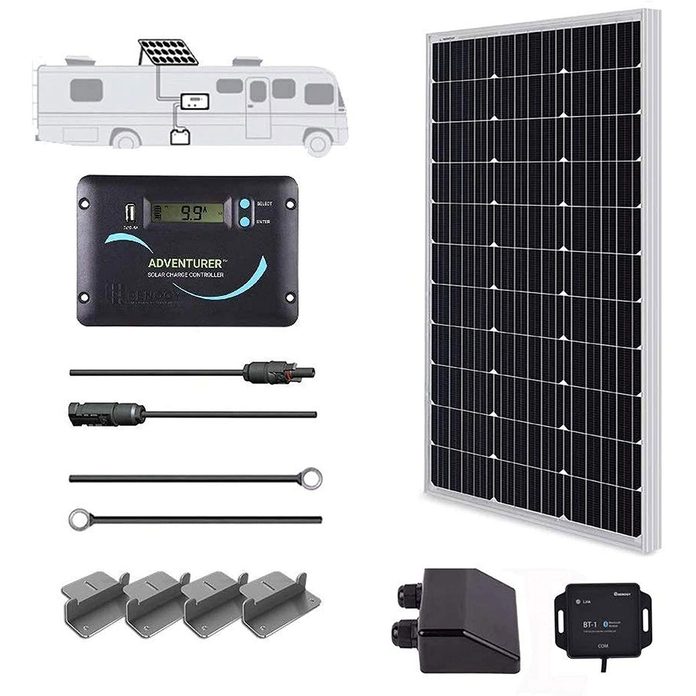
Best Expandable Solar RV Kit
Renogy 100-watt solar kit + 30-amp charge controller + cables
If running a solar system to power electrical items in your RV is new to you, and you want to try it on a small scale, this 12-volt kit is ideal. The Renogy name has a superb track record in the field, and this kit comes with an oversized 30-amp charge controller. A charge controller is essential with every photovoltaic system that uses batteries. It governs the amount of power going to the battery so it lasts as long as possible.
With this kit, all you need to do is add a battery to enjoy DC power without firing up a generator. Add an inverter to the system if you need AC power to run small appliances and charging equipment. At 100 watts of peak output, this solar kit can recharge a 100-amp-hour battery from 50 percent discharged to 100 percent in six to eight hours. Not crazy-fast, but you can add additional panels later if you want a faster charge time. The basic 30-amp charge controller that comes with this kit offers room to expand your system. It can safely handle an additional 260 watts of solar panel output.
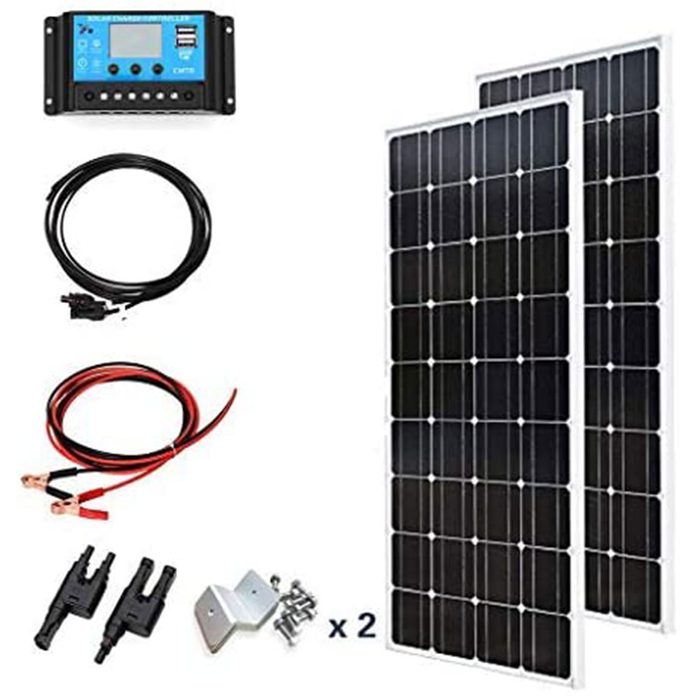
Best Basic Solar RV Kit
XINPUGUANG 200 watt kit + 20 amp charge controller + cables
In addition to offering energy output that’s more than adequate for a small RV system, the solar panels in this 12-volt kit are physically flexible enough to conform to the curved roof of an RV for mounting. Each kit also comes with cables to connect the photovoltaic panels to the basic 20-amp charge controller, plus other cables to connect the charge controller and the battery. Although adequate, the charge controller that comes as part of the kit offers no capacity for additional photovoltaic panels if you want to add any for faster recharging times.
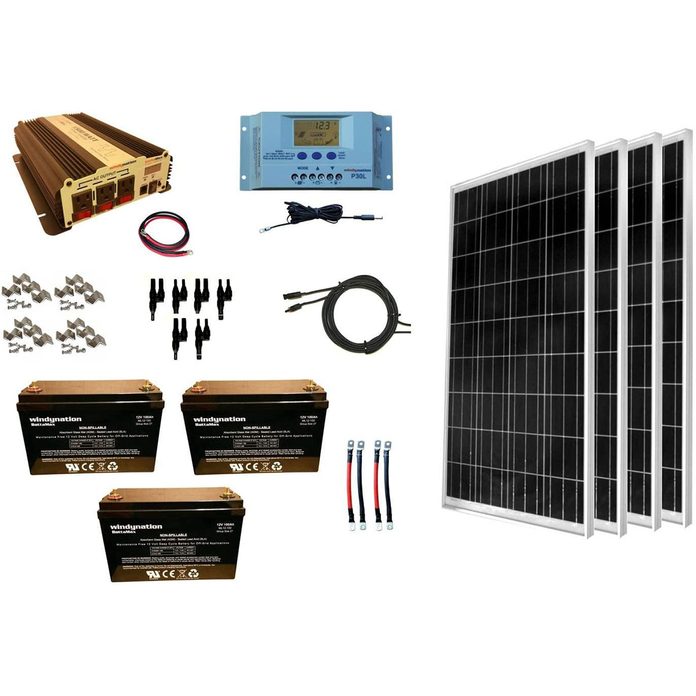
Best Large, Complete Solar RV Kit
WindyNation 400 watt + 30 amp charge controller + 1500 watt inverter + AGM battery + cables
This is a big, complete, 12-volt RV solar power kit that includes everything you need to get up and running. WindyNation has a long track record in the off-grid energy world, and this kit comes with four 100-watt photovoltaic panels.
The 1,500-watt inverter that’s also part of the kit is large enough to provide 120 volts of AC power for fairly high-draw items such as an electric kettle, a microwave or a clothes iron. If you want more peak power than this you’ll need a larger inverter. Although the charge controller that comes with this system has no excess capacity to accommodate additional panels, the 400 watts of peak solar power is large enough to satisfy most RVers.
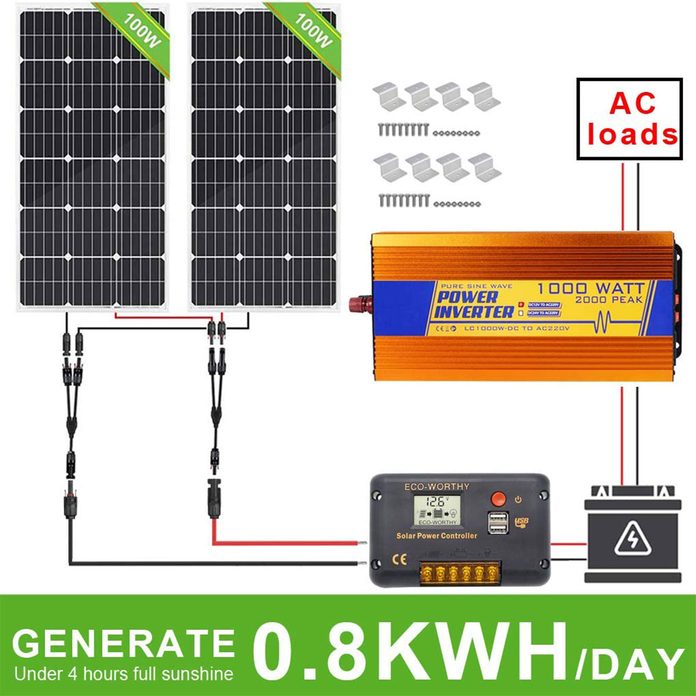
Best Small Solar RV Kit
ECO-WORTHY 200 watt + 1000 watt pure sine wave inverter+ 20 amp charge controller + cables
This kit includes everything you need to generate 12-volt DC and 120-volt AC power. Just add one or more batteries to the system and you’re ready to go. Although the inverter can only put out a maximum of 1,000 watts of AC power, the pure sine wave power output is clean and suitable for safely powering the most sensitive electronics.
(“Pure sine wave power output” refers to the quality and cleanliness of electrical output. Modified sine wave inverters cost less but can’t be used to power electronics.)
RV owners install systems like this to handle small electrical loads such as lighting, charging and small-scale cooling, leaving the big power demands to a gas-powered generator. The non-flexible solar panels come with mounting clips. And the charge controller has a particularly easy-to-read screen so you can easily monitor battery voltage and charge state.
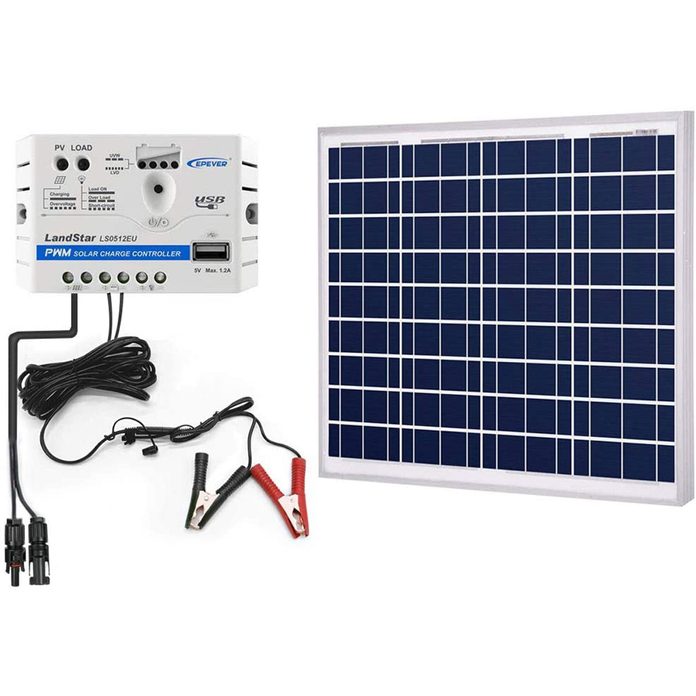
Best Micro Solar RV Kit
ACOPOWER 50 watt panel + 5 amp charge controller + cables
This economical, compact kit has a great track record in the field. It’s made for people who want solar power only for small-draw applications such as charging phones and energizing a few LED lights. If you’ve already got decent generator support for your RV and just want something to provide basic power that’s silent and fume-free, this kit is worth a look.
The panel itself weighs only 10 pounds and measures a compact 26-1/2 in. x 21-3/4 in. x 1-1/2 in. Although you’ll need to buy and connect an inverter to your battery to get 120-volt AC power output, the charge controller itself has a USB port for direct charging of phones, lithium booster batteries and anything else that uses a USB cable.
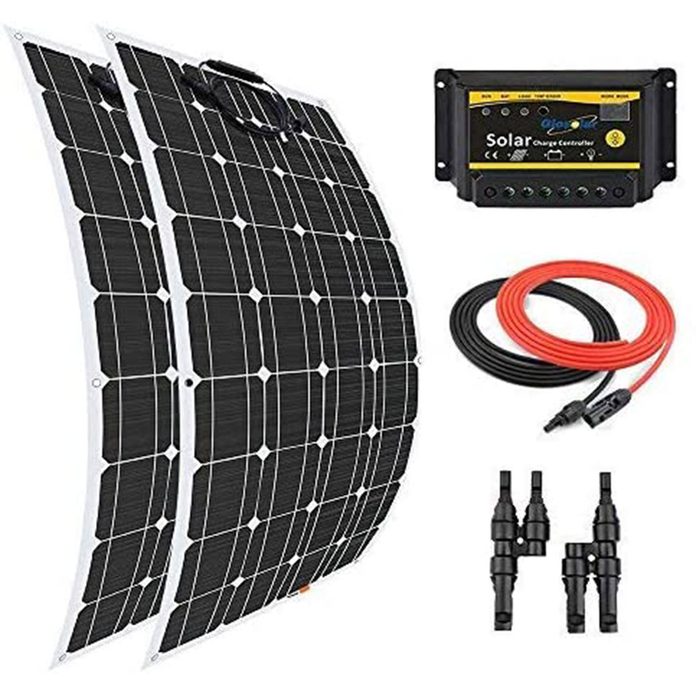
Best Flexible Panel Solar RV Kit
Giosolar 200 watt kit + 20 amp charge controller + cables
This kit includes physically flexible solar panels that can be mounted on the curved roof of any RV. In addition to what’s included with the kit, you’ll need to add a battery to make this a functional system that delivers DC power. If you also want 120-volt AC power, you’ll need an inverter in your setup.
Any solar panel will only deliver its rated wattage output under ideal conditions, so gauge your expectations accordingly. The 200-watt panels in this kit can recharge a 200-amp-hour battery bank from 50% to 100% during a typical day of RV driving in sunny conditions. For what it’s worth, the Giosolar panels also come with a 25-year output warranty.
FAQs
How many solar panels do I need to fully power my RV?
The amount or size of solar panels you need to power your RV depends on how much you are powering within your vehicle. If you’re looking to power a small fridge along with a few other small appliances, 100 watts will suffice. If your RV has a large fridge, air conditioning, an electric stove and other large appliances, you may need closer to 500 watts of solar power.
We recommend starting with the Renogy solar kit mentioned above. It will allow you to gauge how much energy you need to run your RV and add more panels if needed. Also, take into account how much sun your solar panels will be exposed to. Thoroughly read product descriptions to help you find the most efficient option.
Should I use mounted or portable RV panels on my RV?
Think about how much energy you’re looking to source from solar, how often and where you travel and the size or shape of your RV when considering purchasing mounted or portable solar panels. Mounted RV panels typically come with equipment to permanently install them on the roof of your RV. They are more durable and made to withstand the elements since they will be outside all season. Portable RV panels fold up for easy storage and are built to be taken down and set up again at each new site you travel to. They can withstand light wind and rain but are not built to be set up outside permanently.
What other equipment will I need to use solar panels on my RV?
Depending on the kit you buy, you may also need to purchase a battery for energy storage, an inverter, a charge controller to help the battery last longer and a battery monitor to alert you when the charge is low. Thoroughly read the product description of the solar panel you’re looking to purchase before getting any of these additional pieces of equipment. Many times these items are included in the kit with the panels.

